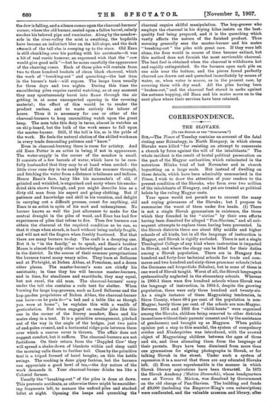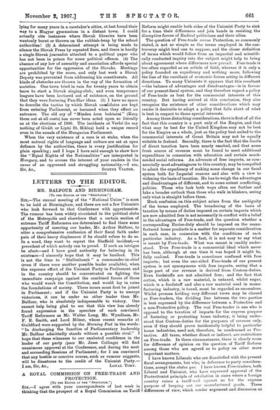CORRESPONDENCE.
THE SLOVAKS.
LTO TOR EDITOR Of THE "SPECTATOR:1
Si,—The Times of Tuesday contains an account of the fatal rioting near Rozsahegy, in North Hungary, in which eleven Slovaks were killed "for resisting an attempt to consecrate a church by force against the will of the inhabitants?' The whole incident is the result of brutal political persecution on the part of the Magyar authorities, which culminated in the notorious Hlinka trial of last November and in church boycotting on a large scale. But instead of dwelling on these details, which have been admirably summarised in the Times, I wish to draw the attention of your readers to the present condition of the Slovaks, who form over two million of the inhabitants of Hungary, and yet are treated as political helots by the ruling Magyar caste.
Your space would not permit me to recount the many and crying grievances of the Slovaks ; but I propose to summarise the worst of them under five heads. (1) There is not a single Slovak gymnasium in existence, the three which they founded in the " sixties " by their own efforts having been dissolved for alleged " Pan-Slavism," and all sub- sequent attempts to replace them having been prevented. In the Slovak districts there are about fifty middle and higher schools of all kinds, but in all the language of instruction is Magyar, and Slovak is rigidly excluded. There is not a single Theological College of any kind where instruction is imparted in Slovak, and where the clergy can be fitted for their duties among a Slovak population. There are in Hungary five hundred and forty-four technical schools for trade and com- merce and two hundred and sixty-three grammar schools (what the Germans call bargerliche Schulen), but in none of these is one word of Slovak taught. Worst of all, the Slovak language is systematically neglected in the elementary schools. Whereas in 1900-1 there were five hundred schools where Slovak was the language of instruction, in 1904-5, despite the growing population, there were only three hundred and twenty-six. As a single instance of these Magyarising tendencies, in Biros County, where 884 per cent. of the population is non- Magyar, barely three per cent. of the schools are non-Magyar. Between 1874 and 1892 five " child-hunts " were organised among the Slovaks, children being removed to other districts (sometimes without their parents' consent and by the assistance of gendarmes) and brought up as Magyars. When public opinion put a stop to this scandal, the system of compulsory cr4ches and Kindergarten was introduced, with the avowed object of Magyarising children between the ages of three and six, and thus alienating them from the language of their parents. Boys have been dismissed from more than one gymnasium for signing photographs in Slovak, or for talking Slovak in the street. Under such a system of repression it is a marvel that there are any educated Slovaks left. (2) Even more reprehensible is the manner in which Slovak literary aspirations have been thwarted. In 1875 the Slovak Academy (Matica Slovenskci), whose headquarters were at Turocz St. Marton, was dissolved by Government on the old charge of Pan-Slavism. The building and funds of 28,000 (including the Emperor-King's own subscription) were confiscated, and the valuable museum and library, after
lying for many years in a caretaker's attics, at last found their way to a Magyar gymnasium in a distant town. I could actually cite instances where Slovak libraries have been -wantonly burnt or thrown on the rubbish-heap by the school authorities! (3) A determined attempt is being made to silence the Slovak Press by repeated fines, and there is hardly a single Slovak journalist attached to a political paper who has not been in prison for some political offence. (4) The absence of any law of assembly and association affords special opportunities for the oppression of the Slovaks. Meetings are prohibited by the score, and only last week a Slovak Deputy was prevented from addressing his constituents. All kinds of obstacles are thrown in the way of the formation of societies. One town tried in vain for twenty years to obtain leave to start a Slovak singing-club; and even temperance leagues have been hectored out of existence, on the ground that they were fostering Pan-Slav ideas. (5) I have no space to describe the tactics by which Slovak candidates are kept from entering Parliament, or harassed when they effect an entrance. The old cry ot "Minden Aron buktatni " (Keep them out at all costs) has never been acted upon so literally as at the elections of 1906. The incidents at Verb6 (to say nothing of Girilt or Lipt6 St. Miklos) hold a unique record even in the annals of the Hungarian Parliament.
When the very existence of a race is at stake, when the most natural rights of language and culture are set at open defiance by the authorities, there is every justification for plain speaking ; and I hope I have said enough to show how the "Equal Rights of the Nationalities" are interpreted in Hungary, and to arouse the interest of your readers in the cause of an oppressed and struggling nationality.—I am,































































 Previous page
Previous page